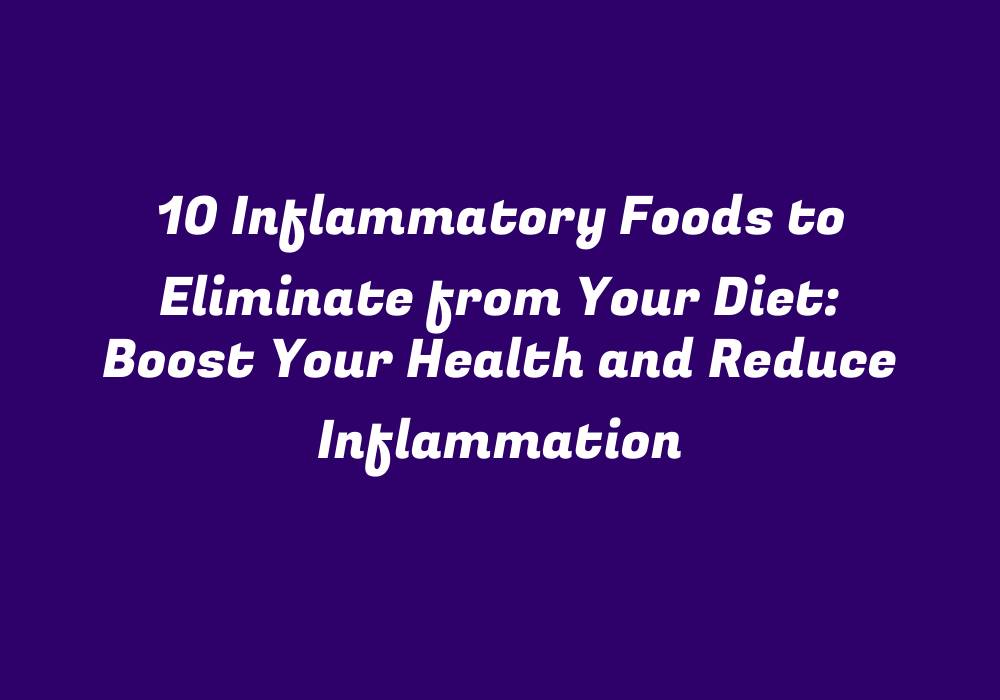Introduction
Inflammation is a natural response of the body’s immune system to protect against harmful substances and heal damaged tissues. However, chronic inflammation can lead to various health issues such as arthritis, heart disease, type 2 diabetes, and certain types of cancer. One crucial factor affecting this condition is your diet. A proper understanding of the relationship between food and inflammation can help you make better nutritional choices to enhance overall health. In this article, we’ll look at 10 inflammatory foods that should be eliminated from your daily diet to reduce inflammation in your body.
White Bread and Processed Carbs
White bread and processed carbs are high on the glycemic index, meaning they quickly increase blood sugar levels and cause a sharp spike in insulin production. This can trigger inflammation in your body. Swap them for whole-grain options like brown rice, quinoa, and oatmeal that have lower glycemic loads, thus reducing the risk of inflammation.
Red Meat
While meat can be a good source of protein and other essential nutrients, some types like red meat are high in saturated fat. High intake of red meat has been linked to increased levels of inflammation-causing compounds known as cytokines and chemokines. Limit your consumption of red meats or opt for leaner cuts and more plant-based protein sources like beans, tofu, and lentils.
Fried Foods
Deep frying is a common cooking method that introduces excessive amounts of unhealthy fat and trans fats into foods. These fats can lead to oxidative stress and inflammation in the body, especially when consumed regularly. Substitute fried meals with healthier cooking methods such as grilling, baking, or sautéing to reduce your intake of these harmful compounds.
Sugary Beverages
Drinks like sodas, juices, and sports drinks can be loaded with added sugars. Consuming excessive amounts of sugar causes rapid fluctuations in blood glucose levels, resulting in increased inflammation. Choose unsweetened beverages or those containing natural sweeteners to minimize your intake of refined sugar.
Refined Grains and Oils
Just like white bread and processed carbs, refined grains and oils also have a high glycemic index. Refined foods are stripped of their natural nutrients, which increases their potential to cause inflammation in the body. Opt for whole-grain alternatives and incorporate healthier fats from avocados, nuts, seeds, olive oil, and fatty fish to improve your overall wellbeing.
Trans Fat
Trans fats are generally found in processed foods like baked goods, fried fast food, and margarine. They can lead to chronic inflammation by altering the body’s metabolic processes and damaging cell membranes. Avoid all products containing trans fat or partially hydrogenated oils to reduce inflammation.
Added Sugars
In addition to sugar in drinks, added sugars are commonly found in various processed foods like candy bars, flavored yogurts, and baked goods. They contribute to an overall increase in blood sugar levels, leading to chronic inflammation. Limit your intake of sweet treats and opt for whole fruits as a healthier alternative.
Alcohol
While moderate alcohol consumption may have some potential health benefits, excessive drinking can lead to an increased risk of inflammatory conditions like heart disease. Limit your alcohol intake or consider eliminating it altogether for better health outcomes.
Artificial Sweeteners
While artificial sweeteners can help lower the amount of added sugar in foods, they can still have adverse effects on your body. Some studies suggest that consuming high amounts of these substances might trigger inflammatory responses. Avoid using excessive quantities and opt for natural alternatives like honey or stevia when possible.
Dairy Products
Some people may have sensitivities to dairy products that can result in increased levels of inflammation. If you experience bloating, gas, or discomfort after consuming milk or other dairy items, consider eliminating them from your diet and exploring alternative sources of calcium like leafy greens or fortified plant-based milks.
In conclusion, understanding the connection between food and inflammation is essential for maintaining overall health. By eliminating these 10 inflammatory foods from your daily diet and opting for healthier alternatives, you can take a significant step towards reducing chronic inflammation and boosting your wellbeing. Remember that gradual changes in eating habits will help ensure long-term success and improve your quality of life.
